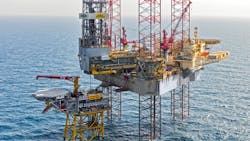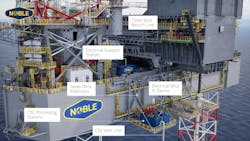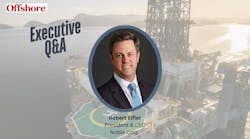CCS deployment: Noble's modular rig system aims to accelerate offshore CO2 storage solutions
Key Highlights
- The joint industry partnership accelerates development by enabling collaborative testing, validation and standardization across multiple stakeholders.
- Design considerations include compliance with emerging safety standards and regulations, ensuring faster approval and deployment.
- The system is intended as a rig-agnostic upgrade, promoting industrywide adoption rather than proprietary solutions.
- Milestones over the next five years include prototype validation, class certification, offshore deployment and supporting initial CCS projects globally.
By Ariana Hurtado, Editor-in-Chief
Noble Corp. recently announced a joint industry partnership (JIP)—signed by multiple operators, including several supermajors—to enable offshore CO2 operations and drilling.
The JIP aims to co-develop the world’s first modular drilling package purpose-built for CO2 environments. Noble says this system will be designed to enable safe management of CO2 stored in deep geological formations, contingency relief well capabilities and expansion of necessary CO2 storage potential.
"Legacy drilling systems were never designed to engage with CO2. Noble saw this coming. That’s why we’ve spent years defining what offshore CO2 well control should look like, and now, we’re building it," Noble posted on its LinkedIn earlier this month. "The market signal is clear: operators are ready to co-invest in the solution. We’re moving from design to execution with development of the first prototype, and full-scale deployment planned this decade."
Offshore's Jeremy Beckman chatted with Zachary Bruton, Noble's senior innovation specialist, at the start of the year about how the company was progressing the design and development of equipment to enable drilling in reservoirs and aquifers already injected with CO2. That followed the 2024 completion of a qualification exercise for a CO2 Certified Rig, involving Noble, DNV and select operators.
Fast forward, and Offshore caught up with Bruton this month to learn more about the recent JIP and the CCS/CO2 modular rig technology in the works.
Offshore: What are the key engineering challenges in adapting drilling systems for CO2 environments, and how does the modular design address those challenges compared to legacy systems?
Bruton: CO2 introduces challenges that differ from hydrocarbons, including rapid phase changes, cryogenic cooling, corrosion pathways, dispersion risks and higher leakage potential across seals and connectors. Legacy systems were engineered around hydrocarbon behavior and require requalification rather than incremental certification for CO2 service. The modular architecture isolates CO2-critical components—flow paths, shut-in systems and vent handling—into new subsystems rather than redesigning the entire rig. That approach enables faster deployment and upgrades while maintaining compatibility with existing rig infrastructure.
Offshore: How does the JIP structure accelerate development, and what role do supermajors play in shaping the specifications for CO2 well control?
Bruton: The JIP gives operators, vendors and researchers a shared platform to define requirements, validate assumptions and test materials collaboratively, rather than each organization developing isolated solutions. Major international operators contribute global project pipelines and scenario data that anchor system design in real upcoming wells rather than hypothetical requirements. Importantly, the JIP isn’t limited to early study phases. It's also the vehicle through full development, from component testing to prototyping, qualification, integration and deployment. This continuity helps ensure the hardware delivered at the end matches the operational needs that defined it at the beginning.
Offshore: What regulatory frameworks or safety standards are influencing the design of this CO2 drilling package, and how do you see this technology impacting global CCS deployment timelines?
Bruton: Offshore CO2 guidance, standards and class rules are still emerging across multiple jurisdictions. Instead of designing to dated hydrocarbon assumptions, the system is being engineered with forward-looking safety and compliance requirements anticipated from governments and class societies. Developing the system ahead of finalized regulations allows alignment rather than rework once standards mature. This reduces approval cycles later and supports faster execution when operators are ready to drill.
Offshore: What steps are being taken to ensure this modular CO2 drilling package becomes an industry standard rather than a proprietary solution, and how will access be managed for operators globally?
Bruton: The system is built as a modular, rig-agnostic upgrade rather than a bespoke solution tied to any single operator or contract. By allowing multiple stakeholders to contribute to the design from inception, the goal is broader adoption rather than a closed or vendor-specific standard. Access models are still being evaluated, but deployment is being scoped for global availability with the necessary controls on training, safety and certification. This solution goes beyond just Noble’s customers. The intent is to enable a new operational capability for the entire industry, not create a proprietary gate.
Offshore: Beyond prototype development, what does the roadmap look like for full production and deployment, and what milestones should the industry expect over the next five years?
Bruton: Current efforts focus on defining system requirements, material testing and validating subsystem architecture under CO2 conditions. This transitions into full-scale prototyping, class compliance, and integration onto offshore units alongside crew training and operational procedures. Deployment readiness will proceed in parallel with qualification so early CCS projects can utilize the first systems as they come online. Over the next five years, the goal is to move from design to multiple field-ready systems supporting initial offshore CO2 campaigns.
About the Author
Ariana Hurtado
Editor-in-Chief
With more than a decade of copy editing, project management and journalism experience, Ariana Hurtado is a seasoned managing editor born and raised in the energy capital of the world—Houston, Texas. She currently serves as editor-in-chief of Offshore, overseeing the editorial team, its content and the brand's growth from a digital perspective.
Utilizing her editorial expertise, she manages digital media for the Offshore team. She also helps create and oversee new special industry reports and revolutionizes existing supplements, while also contributing content to Offshore's magazine, newsletters and website as a copy editor and writer.
Prior to her current role, she served as Offshore's editor and director of special reports from April 2022 to December 2024. Before joining Offshore, she served as senior managing editor of publications with Hart Energy. Prior to her nearly nine years with Hart, she worked on the copy desk as a news editor at the Houston Chronicle.
She graduated magna cum laude with a bachelor's degree in journalism from the University of Houston.




